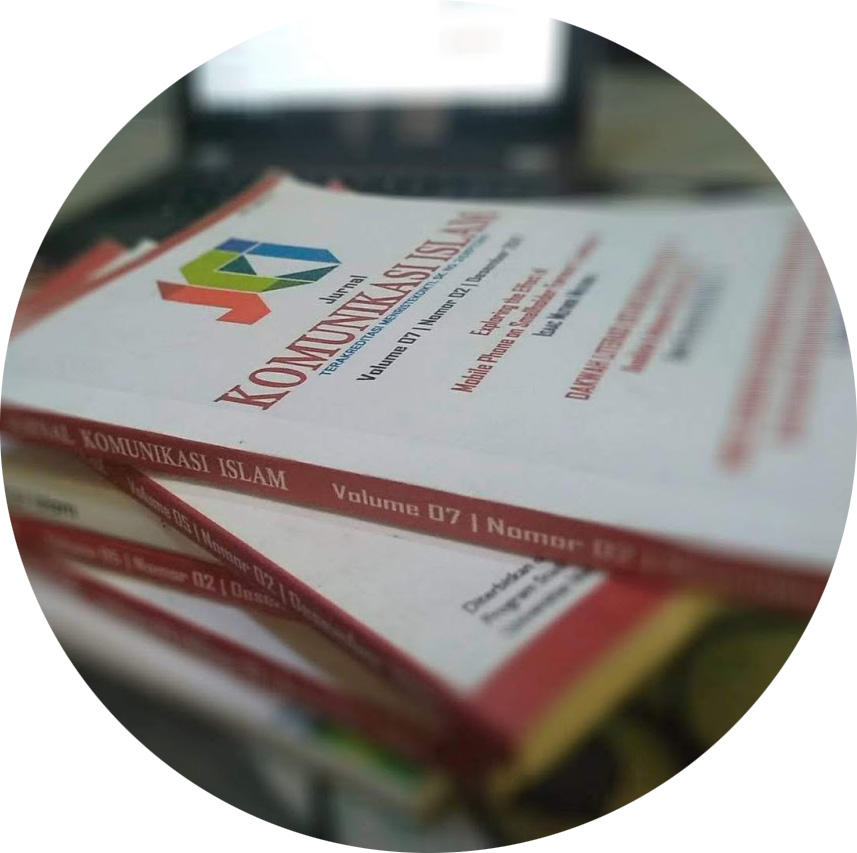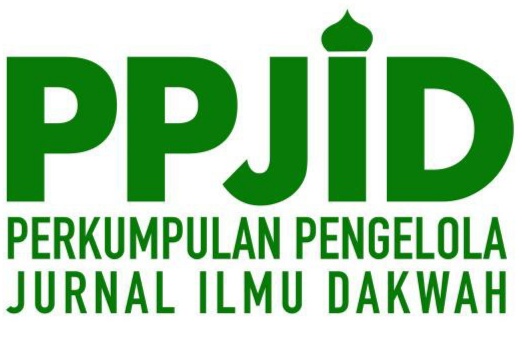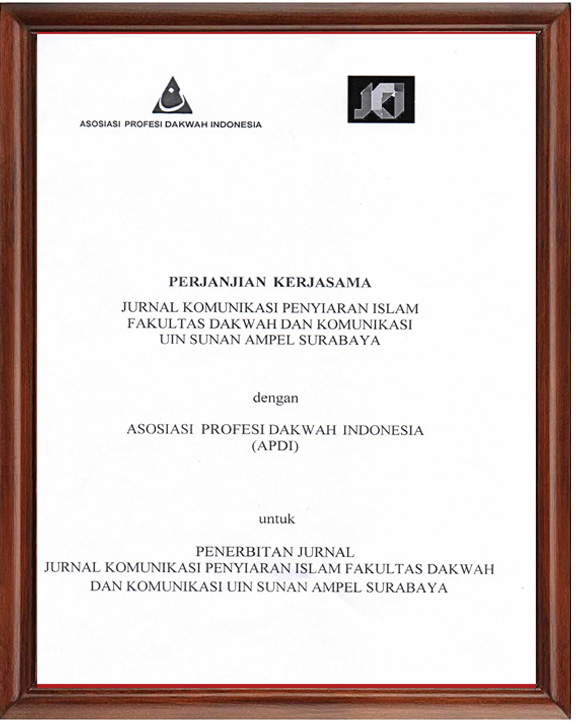Dakwah Politik dalam Paradigma Simbiotik
DOI:
https://doi.org/10.15642/jki.2019.9.1.58-81Keywords:
dakwah politik, kemaslakhatan umat, manajemen dakwahAbstract
This paper examines the relationship between da'wah and politics based on a symbiotic paradigm. Through a historical-critical approach, this paper found that the relationship between da'wah and politics has an inseparable relationship. Historically, the Prophet Muhammad and the Muslim scholars have practised a symbiotic pattern of political da'wah. In this context, da'wah conducted within the frame of idealism, which is to spread the goodness of religious teachings. In this regard, various benefits and goodness for the community and get the pleasure of God. Furthermore, political propaganda emphasizes balance and benefit for the people. Therefore, propaganda and political symbiosis, at a certain level, have given room for the development of democracy. In this regard, it is necessary to have a proselytising management approach.
Downloads
References
Ahmad, Z.A. (1975). Riwayat Hidup Imam al-Gazali. Jakarta: Bulan Bintang.
Al-Ghazali. (1975). Ihy?’ ‘Ul?m al-D?n. Beirut: D?r al-Fikr.
Al-Ghazali. (1983). The Alchemy of Happines (Penterjemah, Claud Field). London: The Octagon Press.
Al-Ghazali. (1988). al-Tibr al-Masb?k fi Nash?hat al-Mul?. Beirut-Libanon: D?r al-Kut?b al-‘Ilmiyah.
Al-Syahrastani. (1951). al-Mil?l wa al-Nihal. Kairo: D?r al-Fikr.
Al-Wakil, M.S. (2001). Prinsip dan Kode Etik Dakwah. Jakarta: Akademika Pressindo.
Aristoteles. (1953). The Ethics. England: Penguin Books.
Asad, M. (1999). The Principle of State and Government in Islam. Kuala Lumpur: Islamic Book Trust.
Asroni, A et al. (2003). Dakwah dan politik: Menakar kontribusi organisasi Islam sayap partai politik bagi masyarakat muslim Yogyakarta. Jurnal Dakwah, 19(2)
Aziz, M.A. (2015). Ilmu Dakwah. Jakarta: Kencana.
Bagley, F.R.C. (1964). Ghazali’s Book of Councel for Kings. London: Oxford University Press.
Bakri, A.R.A. (tth). Min Hay?t Khal?fah ‘Umar bin Khattab. Beirut: al-Irsy?d.
Black, Antony. (2001). The History of Islamic Political Thought: From the Prophet to the Present. Ediburgh: Ediburgh University Pess.
Brown, D.W. (2004). A New Introduction to Islam. United Kingdom: Wiley-Blackwell.
Brown, J.A.C. (2006). The last day of al-Ghazzali and the tripartite division of the sufi world: Abu Hamid al-Ghazzali’s letter to the Seljuq Vizier and commentary. The Muslim World. 96 (2)
Crick, B. (1964). In Defence of Politics. London: Pelican Books.
Hasanuddin. (2005). Manajemen Dakwah. Jakarta: UIN Jakarta Press.
Hasbi, A. (2001). Musyawarah dan demokrasi: Analisis konseptual aplikatif dalam lintasan sejarah pemikiran politik Islam. Jakarta: Gaya Media Pratama.
Hillenbrand, C. (1988). Islamic orthodoxy or realpolitik? al-Ghazali’s views on government. Journal of the British Institute of Persian Studies.
Kusumo, F.A. (2014). Berdakwah-melalui-politik-vs-berpolitik-melalui-dakwah. Diakses dari http://f-adikusumo. staff.ugm.ac.id/math/index.php
Lambton, A.K.S. (1954). The theory of kingship in the Nashihat al-Muluk of al-Ghazali. The Islamic Quarterly, I, (1).
Lambton, A.K.S. (1995). Sufi and the State in Medieval Persia. Leiden: Research School of The Netherlands.
Lasswell, H. (1958). Politics: Who Gets Whats, When, How. Cleveland: World Publishing Company.
Lewis, B. (1997). The Political Language of Islam. Chicago and London: The University of Chicago Press.
Malamud, M. (1994). Sufi organizations and structures of authority in Medieval Nishapur, International Journal Middle East Study, 26(2).
Manulang M. (1981). Dasar-Dasar Manajemen. Jakarta: Ghalia Indonesia.
Mubarak, M. (1984). Nidz?m al-Isl?m: al-Aq?dah wa al-‘Ib?dah. Beirut: D?r al-Fikr.
Munir, M., & Wahyu, I. (2009). Manajemen Dakwah. Jakarta: Kencana.
Mustofa, K. (2012). Dakwah Di Balik Kekuasaan. Bandung: Remaja Rosdakarya.
Nasution, H., & Effendy, B. (ed.). (1987). Hak Azasi Manusi dalam Islam. Jakarta: Pustaka Firdaus.
Rais, D. (tth). al-Nadzriy?t al-Siy?siyyat al-Isl?miyyah. Kairo: Maktabah Dar al-Turats.
Ridwan, H.R. (2007). Fiqih Politik: Gagasan, Harapan, dan Kenyataan. Yogyakarta: FH UII Press.
Rosa, A. (2014). Politik Dakwah dan Dakwah Politik di Era Reformasi Indonesia. Walisongo, 22 (2)
Saputra, W. (2011). Pengantar Ilmu Dakwah. Jakarta: Rajagrafindo Persada.
Sibawaihi. (2001). Eskatologi al-Ghazali dan Fazlur Rahman: Studi Komparatif Epistemologi Klasik-Kontemporer. Yogyakarta: Islamika.
Taimiyah, I. (1969). al-Siy?sah al-Syar’iyyah fi Ishl?h al-R?iy wa al-R?aiyyah. ttp.: D?r al-Kutub al-‘Arab.
Thaib, L. (1990). The Nation of State in Islam. Kuala Lumpur: Quill Publishers.
Turner, R., & Killian, L. (1957). Collective Behavior. New York: Prentice-Hall.
Yuliyatun. (2016). Manajemen Organisasi Islam: Menjawab Konflik Keberagamaan dan Intoleransi. Tadir, 2. Kuala Lumpur: Quill Publishers.
Downloads
Published
How to Cite
Issue
Section
License
Copyright (c) 2019 Syamsul Yakin

This work is licensed under a Creative Commons Attribution-ShareAlike 4.0 International License.













